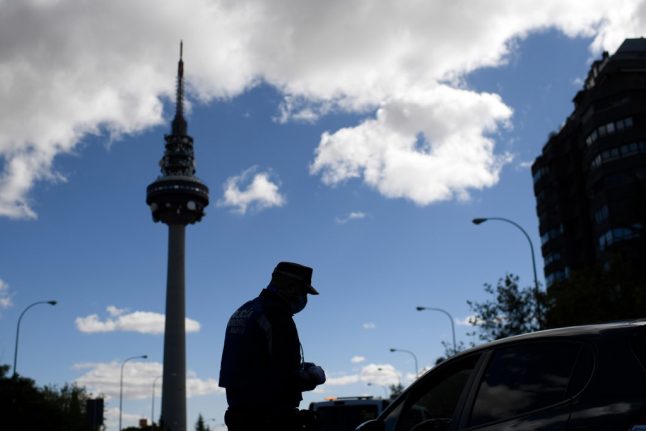Closed borders until when?
The Spanish government has asked the regions that adopted the closed borders policy keep it in place until November 9th.
This includes all the autonomous communities in Spain except for the Canary Islands, the Balearic Islands and Extremadura.
Madrid’s regional government has defied the Moncloa national government by choosing to instead only close its borders on the All Saints’ long weekend that’s passed and their regional “puente” of La Almudena ending on November 9th.
But in other regions such as Andalusia, the regional government is in favour of keeping regional borders closed until the national state of emergency is over, which technically ends on November 9th but a six-month extension has already been approved.
READ MORE: What are the restrictions in place in each of Spain's regions right now?
Possible home lockdown in November?
November 9th is also the date which Spain’s socialist government has marked as when they will decide whether the current regional confinement measures and curfews have served to curb the spike in Covid-19 cases in much of Spain, or whether stricter actions are needed.
“Let’s not jump phases,” Vice President Carmen Calvo said on Tuesday, as the governments of Asturias and Castilla y La Mancha have already requested a return to the home confinement of last March.
New restrictions for restaurants and bars may well be implemented in regions with high coronavirus incidence rates (full closures were announced by Castilla y Leon on Tuesday) but the Spanish government is now running out of options other than a full stay-at-home lockdown, even though so far they’ve refused to confirm anything on the matter.

Covid test to visit the Canary Islands
Despite the fact that most of Spain isn’t open for leisure and non-essential travel, the Canary Islands hasn’t needed to implement the closed borders or curfew policies and is now welcoming European tourists.
However, from November 13th holidaymakers visiting the islands will have to present a negative Covid-19 test to check into their accommodation.
Visitors must show a PCR or negative antigen test carried out a maximum of 72 hours in advance of their arrival on the islands.
READ MORE: What we know about Canary Islands' compulsory Covid-19 tests for tourists
Changes to electricity bills in Spain
Spain’s National Commission of Markets and Competition decided back in February it would change its way of calculating the country’s rates of electricity transmission and distribution, a measure which comes into force this November.
Among the main changes are the ability to add different voltages to your contract (useful for electric car users) as well as modifications to the rates based on time brackets (there will be peak, flat and low hours).
The three time periods – period 1 (peak), period 2 (flat) and period 3 (low) – are illustrated in the diagram below.

More money for Madrid's struggling self-employed
Madrid is going to allocate €15 million to its “autónomo” workforce this November, the sector that is suffering the most from the coronavirus crisis.
A total of €7 million of this “Impulsa Plan” will be given as €3,200 aid packages to self-employed workers who can prove that they have been affected by the crisis and who have continued working during the pandemic.
The beneficiaries must be self-employed workers without employees.
Aragón inheritance tax reduced
If you live in Aragón or have a close family member who lives there, here’s some good news.
Aragón has increased the amount of inheritance which is exempt from tax to €500,000, a measure which comes into force in November 2020.
Ryanair gives more flexibility to passengers scheduled to fly to Spain
Customers who book their trips to Spain in November with the Irish carrier can change their tickets free of charge to travel until March 21st, 2021.
This is of particular interest to British tourists who may have booked flights to Spain before seeing how growing restrictions in the country could affect their holiday plans, as well as the UK's impeding return to lockdown on November 5th.
The low-cost airline has explained these changes must be made at least seven days before the original date of departure.
“In order to provide as much flexibility and confidence as possible to our customers during the autumn months, we have extended the cancellation of the usual fees for flight changes to November bookings,” Ryanair said.
 Photo: Jake Belucci/Flickr
Photo: Jake Belucci/Flickr
Calçots season starts
There’s not a lot to look forward to during these difficult times, but if you live in Catalonia maybe you can get your loved ones together for a traditional calçots feast, as November is when calçots season starts.
In case you’re wonderig, calçots are a seasonal vegetable similar to leeks or spring onions grown in the area surrounding Barcelona and Tarragona.
The best way to try them is cooked on a barbecue accompanied by Romesco sauce, with local wine and a group of friends. ¡Bon profit!




 Please whitelist us to continue reading.
Please whitelist us to continue reading.
Member comments